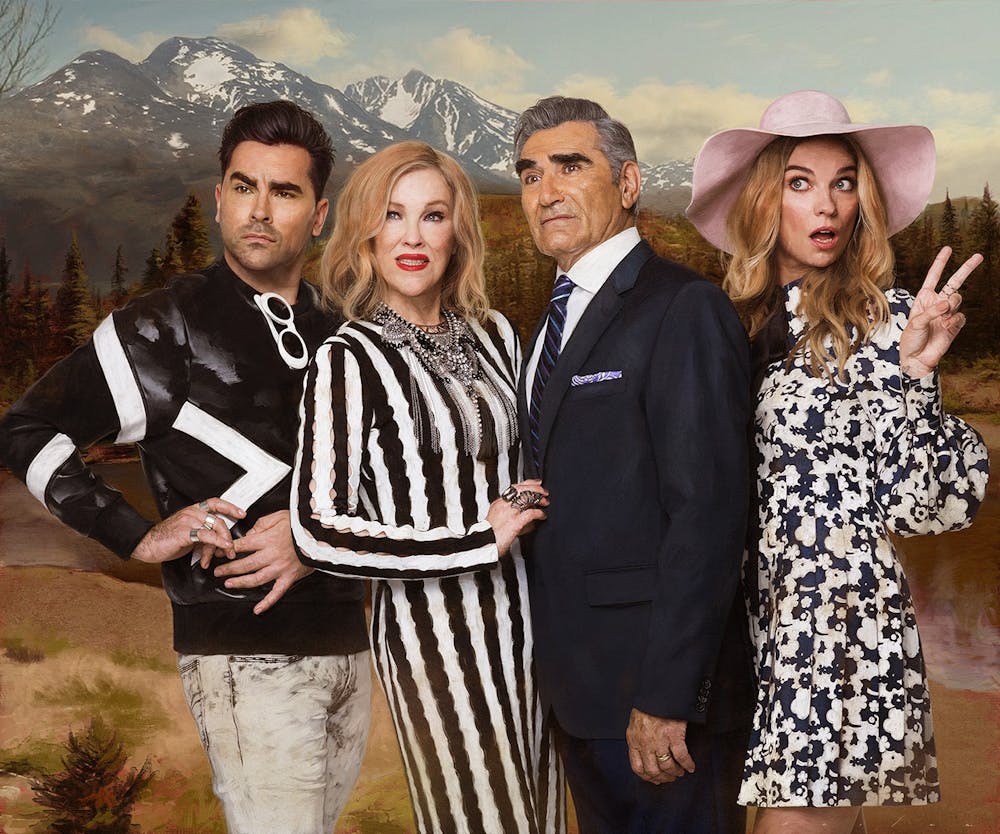Schitt’s Creek is one of those rare family sitcoms that revels in sincerity and genuine kindness. Unlike other well–known, feel–good sitcoms on television today, such as The Good Place or Brooklyn Nine-Nine, it chooses not to focus on existential philosophy or action–filled police casework. All it has are its characters, the Roses, and their small–town problems and skirmishes.
And yet, despite its limited scope, the show shines with the importance of family and friendship; not sappy nor preachy, it's genuinely funny with a bite of sarcasm that keeps it feeling fresh. When I started watching the show due to its fantastic word–of–mouth praise and prominent LGBTQ representation, I asked myself if I really wanted to watch a show about another rich, white family. I have never been happier to have been proven wrong.
There’s something to say about sitcoms like It’s Always Sunny in Philadelphia, whose characters are likable despite their continuous bad behavior. But it’s even more special when a show takes characters and forces them to change themselves for the better. While optimistically unrealistic that the mega–wealthy would ever change as much as the Roses have, it’s wonderful to live in a world where billionaires stripped of their wealth would get a chance at self–improvement. The Roses are an always too–shiny part of the world they’re in, over–acted and caricature–like in the best of ways, dramatic in contrast to everyone else around them.
The sixth and final season of Schitt’s Creek is in the middle of premiering right now, and the first episode anticipates a wonderful, heartfelt final season. Spoilers ahead.
The season six premiere continues right after the last episode of season five. The small town of Schitt’s Creek has just been rocked by an amazing performance of the musical Cabaret; Stevie literally still has her makeup on. All of the main characters gathered at the Rosebud Motel to celebrate the show and David’s (Dan Levy) recent engagement, only to be interrupted by Moira’s (Catherine O'Hara) despair at her movie being shelved.
The sixth season jumps from there to a hunt for David and Patrick’s (Noah Reid) wedding venue. Schitt’s Creek has always thrived on introducing its conflict in an unexpected way. There's no traditional wedding drama or a big subplot about the grooms disagreeing. There's something warmly reassuring about knowing no relationship conflict or narrative hang–up will every truly derail the loving relationships between all of the characters—it’s a certainty not available to us in real life.
The episode’s conflict instead centers around the relationship between David and Alexis (Annie Murphy), the siblings at the heart of the show, who have grown the most since the show started. The conflict is resolved quickly and conveniently in the 20–minute episode, a lovely side effect of the episodic nature of a family sitcom that doesn’t take itself too seriously. I saw the ending coming—it would be obvious to any long–term viewer that Alexis and David love each other and that the wedding will probably take place at the motel so important to the storyline. But that doesn’t make it any less emotionally rich or satisfying.
There's an art in having characters improve while remaining so similar, even as they enter their last season together. Moira is still over–dramatic and mournful. Alexis and David still possess the capability of somehow moving every part of their face completely independently. Johnny (Eugene Levy) is still a level–headed, loving husband.
There's an abundance of grittiness on television today, filled with anti–heroes and moral depravity in the name of humor or realism. Schitt’s Creek has hearkened back to the age of the sincere sitcom, to the kindness of shows like The Office and Parks and Recreation. It is, above all, a show that speaks to the warm sincerity and beauty of loving the people that annoy you the most—whether they be the residents of a shit town you’ve had to move to or your own family.

